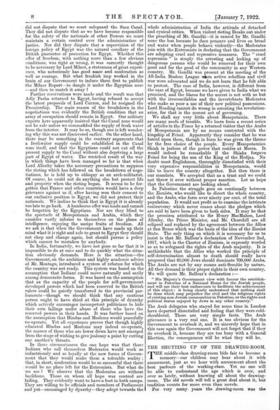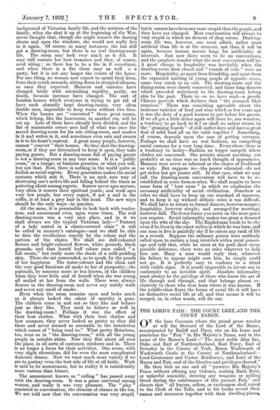THE SHUTTING UP OF THE DRAWING-ROOM. T HE middle-class drawing-room bids
fair to become a memory—our children may hear about it with amusement, just as we hear with amusement about the best parlours of the working-class. Yet no one will be able to understand the age which is over, and over so lately, without knowing all about the drawing- room. The old novels will tell a great deal about it, but tradition counts for more even than novels.
For - very many- years the drawing-room was the background of Victorian family life, and the mistress of the family, when she shut it up at the beginning of the War, never thought that, though she might remove the dusting sheets and open the windows, she would not really live in it again. Of course, in many instances, she has still got a drawing-room, but there is no real drawing-room life. The room may look very much as it did. It may still contain her best treasures and they, of course, need airing ; so there has to be a fire in it sometimes, and when there is a fire there may as well e a party, but it is not any longer the centre of the home. For one .thing, no women now expect to spend their lives, from their youth onwards, sitting down in occupied idleness, as once they expected. Manners and customs have changed lately with astonishing rapidity, partly, no doubt, because incomes have changed. The sort of London houses which everyone is trying to get rid of have such absurdly large drawing-rooms, very often double ones, impossible to keep warm without two fires. When the houses are " converted " these great rooms, which belong, like the basements, to another era, will be cut up. Lots of them have already been divided, and the flat or maisonette owner uses half of what was once the sacred drawing-room for his sole sitting-room, and smokes in it and writes in it, and sometimes even eats and swears in it to his heart's content. A great many people, however, cannot " convert " their houses. So they shut the drawing- room, or if they are determined to keep it open, they take paying guests. But a drawing-room full of paying guests is not a drawing-room in any true sense. It is a " public room," or a lounge, or business premises, or what you will, but not that. Now, there is nothing in the world quite so foolish as social regrets. Every generation makes the social customs which suit it. There is no such sure way of shortening one's active life and falling behind the times as pottering about among regrets. Sorrow never ages anyone, very often it renews their spiritual youth; and work ages very few people, but every regret, if not a nail in the coffin, is at least a grey hair in the head. The new ways should be the only ways—in practice.
All the same, it is permissible to look back with tender- ness, and amusement even, upon worse times. The real drawing-room was a very nice place, and in it we shall always see the typical Victorian lady—" Portrait of a lady seated in a chintz-covered chair " it will be called in memory's catalogue—and we shall be able to date the recollection exactly by the colour and the pattern of the chintz. We shall see dull-coloured flowers and bright-coloured flowers, white grounds, black grounds, and that horrid buff colour once called " a full cream," but really more the shade of a milk-pudding skin. There she sat surrounded, so to speak, by the proofs of her happiness. The water-colours and the china and the very good furniture all spoke to her of prosperity ; the portraits, by someone more or less known, of the children when they were little and of herself when she was young. all smiled at her from the walls. There were always flowers in the drawing-room and never any untidy work and never any smell of smoke. Even when the room remains open and looks much as it always looked the odour of sanctity is gone. The children come in and out as they like and behave just as they like. They used to behave so well in the drawing-room ! Perhaps it was the effect of their best clothes. What with their best clothes and best manners, they never looked so pretty as they did there and never seemed so amenable to the instruction which comes of " being read to." What pretty flirtations, too, went on in " the drawing-room," with all the young people in suitable attire. Now they flirt about all over the place, in all sorts of costumes, outdoors and in. There is no longer a focus for their activities. One scene, with very slight alterations, did for even the most complicated domestic drama. Now we want much more variety if we are to portray even the best side of life at all fairly. Work is said to be monotonous, but in reality it is considerably more various than leisure.
The amusement known as " calling " has passed away with the drawing-room. It was a game universal among women, and really it was very pleasant. The " play " consisted in conversation, the element of chance in the tea. We are told now that the conversation was very stupid but it cannot have been any more stupid than the people, and they have not changed. Most conversation will always be very stupid in which no element of shop enters. Drawing- room life was, however, one must admit, rather more artificial than life is at the moment, not than it will be again, because human nature longs for artificiality at intervals. Just now there seem to be no conventions, and the prophets wonder what the next convention will be. A great change in hospitality was inevitable when the drawing-room door closed and " rounds of calls " were no more. Hospitality, as apart from friendship, and apart from the organized meeting of young people of opposite sexes, came very much to an end. The drawing-room and the dining-room were closely connected, and those long dinners which preceded retirement to the drawing-room belong also to the past. There is—so we have read—a greedy Chinese proverb which declares that " the stomach likes surprises." There was something agreeable about the immense varieties of food and wine which so few years ago it was the duty of a good hostess to put before her guests. If we all get a little richer again will there be, one wonders, a tendency to go back to it ? or shall we rather return to the "groaning boards" of still earlier days and have a great deal of solid food all on the table together ? Something, of course, depends upon the ease of getting servants. Perhaps we shall have no real fashions, no compelling social customs for a very long time. Everywhere there is a tendency to laxity—Fashion no longer compels where clothes are concerned. She permits almost anything, yet probably at no time was so much thought of appearance. Manners were never so informal or the choice of livelihood so wide. But suppose we—the poorer educated—do not get richer but get poorer still. In that case, what we may call the drawing-room convention will have to be re- established in some form or other. NV i shall require to have some form of " best room " in which we emphazize the necessary artificiality of social civilization. Somehow or other we shall have to keep up our standard of manners, and to keep it up without definite rules is too difficult. We shall have to return to formal dinners, however meagre; hospitality, however simple; and arranged-for meetings, however dull. The fewer forms you insist on the more grace you require. Social informality makes too great a demand upon the wits of the shy. The Englishman tends to be shy even if he lives in the exact milieu in which he was born, and one man in five is painfully shy if he enters any rank of life as a recruit. Suppose the ordinary person were suddenly called upon to sustain a long interview with a royal person- age and told that, while he must at his peril show every possible deference, there were no rules whatever to help him out. Many a man would reply that, whatever his failure to appear might cost him, he simply could not go. It is perfectly easy to conform to a ritual with visible signs. It is nearly impossible to invent one in conformity to an invisible spirit. Absolute informality must always be the privilege of those who know the art of life through and through, and that belongs almost ex- clusively to those who were born where it was known. if the middle-class flouts the forms of social life it will have no distinctive social life at all, and that means it will be merged, or, in other words, will die out.











































 Previous page
Previous page